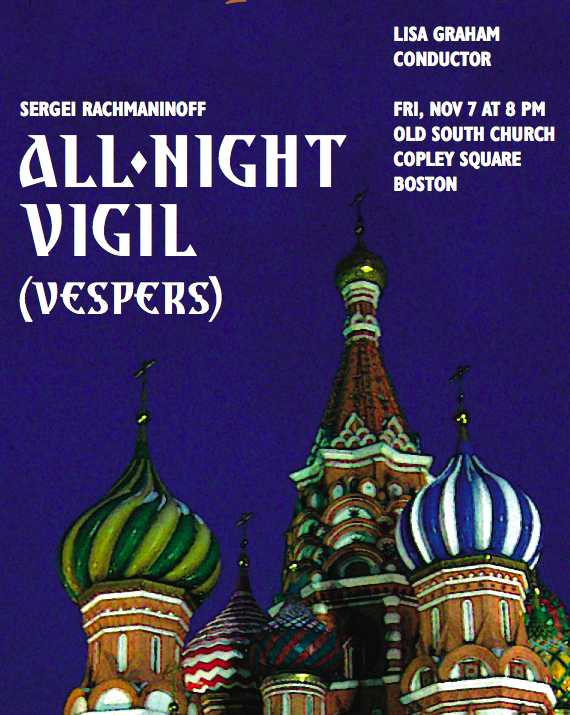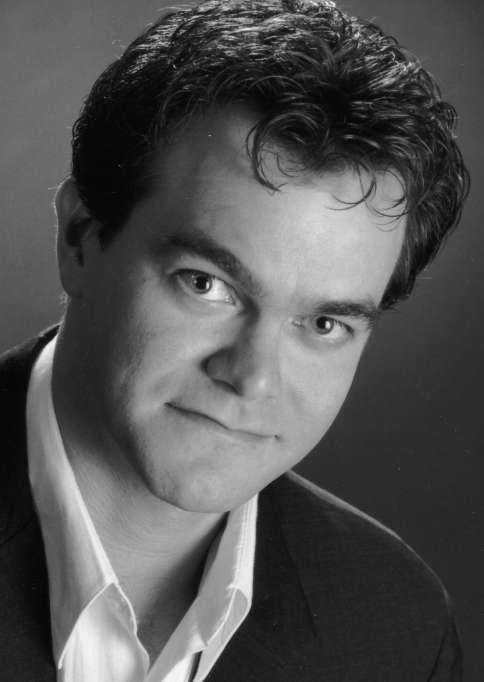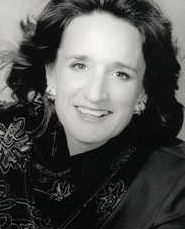

| [Home] | [Buy Tickets: Nov. 7 or Nov 9] |
 |
 |
Сергей Рахманинов: Всеношное бдение
Friday, November 7, 2008 at 8 pm
Old South Church
Copley Square, Boston
And a second concert:
Sunday, November 9, 2008 at 3 pm
St. George Antiochian Orthodox Church
55 Emmonsdale Rd, West Roxbury
Lisa Graham, conductor
See press release for this concert.
Buy tickets to the Nov 7
or Nov 9 concert.

Sergei Rachmaninoff’s All-Night Vigil, or Vsenoshchnoe bdenie, consists of settings of texts taken from the Russian Orthodox All-night vigil ceremony. It has been praised as Rachmaninoff’s finest achievement and indeed as one of the high points of Orthodox music. Rachmaninoff himself requested that its fifth movement be sung at his funeral. First performed in 1915, the work was not heard in its entirety in Boston until 1993. Chorus pro Musica first performed it only seven months after its Boston premiere and last performed it in November 2000.
The All-night vigil ceremony is held in the Orthodox church every Saturday night and on the eve of important liturgical feasts. It includes both Vespers (evening prayers) and Matins (prayers at the sunrise).
| Featuring soloists | |||
|---|---|---|---|
 Charles Blandy tenor |
 Marion Dry contralto |
||
Read the CpM Program Notes from the 2000 concert (including translation).
From the book by Francis Maes, A History of Russian Music (excerpted):
“The special qualities of Rachmaninoff as a composer become clearest in his most outstanding achievement of all: the Vsenoshchnoye bdeniye (All-night Vigil). … Rachmaninoff's Vsenoshchnoye is generally considered one of the high points of Orthodox music… The work satisfies all liturgical demands, but goes beyond them in the same way that Bach's B Minor Mass and Beethoven's Missa Solemnis do. Johann von Gardner, one of the pioneers of the study of Orthodox church music, has bestowed the apt title of "liturgical symphony" on Rachmaninoff's Vsenoshchnoye.
“Rachmaninoff's Vsenoshchnoye has been rightly admired for its imaginative use of traditional chants: five melodies come from the oldest tradirion (the Znamen chants), two from the Greek School (a tradition brought to Russia by Greek chorus masters in the seventeenth century), and two from the School of Kiev. Rachmaninoff was able to fit these chants into a flexible structure in which every number involves a clear rise and fall of tension. … Rachmaninoff was able to exploit the smallest distinctions in tonal range, volume and sonority to the full.”
Here's what Rachmaninoff told his biographer about the first time he played it for Kastalsky and Danilin, director and conductor of the Moscow Synodical Choir:
“My favorite number in the work, which I love as I do The Bells, is the fifth canticle, 'Lord, now lettest Thou Thy servant depart in peace.' I should like this sung at my funeral. Towards the end there is a passage sung by the basses—a scale descending to the lowest B flat in a very slow pianissimo. After I played this passage Danilin shook his head, saying, 'But where are we to find such basses? They are as rare as asparagus at Christmas!' Nevertheless, he did find them. I know the voices of my countrymen, and I well knew what demands I could make upon Russian basses!”
Here are recordings of the two previous CpM performances of the Rachmaninoff Vespers, in 1993 (at the Church of the Advent) and 2000 (at Faneuil Hall). Both performances were conducted hy Jeffrey Rink. The recordings were made by Ted Dyett, and here are in the form of MP3s (the original 1993 recording is from a cassette tape, so you'll hear some hiss). For convenience, each recording has its own column in the table below. Just click on the title to hear it.
| [CpM Home] | [Top] | [Buy Tickets: Nov. 7 or Nov 9] |